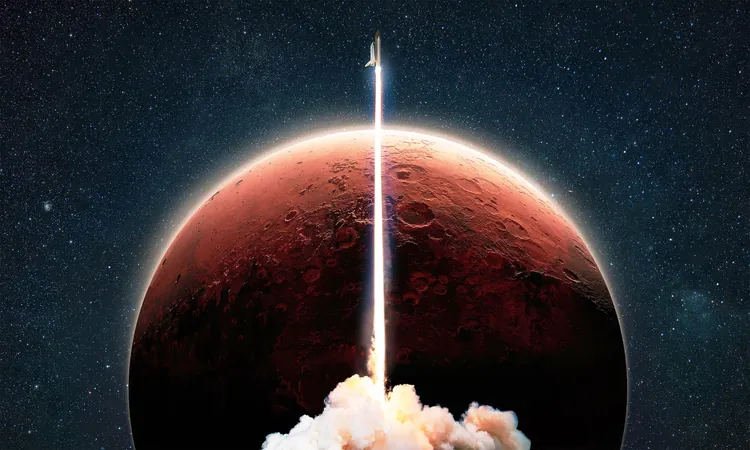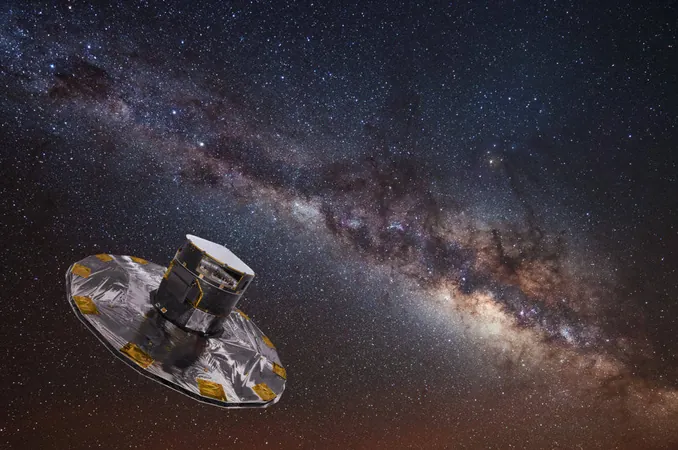
Dangers of Space Travel: Astronauts' Kidneys at Risk on Mars Missions!
2025-03-30
Author: Jessica Wong
Kidney Concerns Unveiled
For years, scientists have been probing the effects of long-term space travel on the human body, and findings raise concerns about kidney health, particularly related to the formation of kidney stones and potential lasting damage. Dr. Keith Siew from the London Tubular Centre has led a comprehensive study examining how prolonged exposure to microgravity and cosmic radiation could alter kidney function.
This study, which is the most extensive of its kind, involved over 40 research institutions from around the globe and analyzed data from 20 different cohorts, including samples from more than 40 missions to the International Space Station (ISS) and several simulations with rodents.
Shocking Findings About Spaceflight's Impact
The research revealed that the structure and functionality of kidneys change significantly in microgravity. Among the most alarming discoveries was that after just one month in space-like conditions, specific kidney tubules—which are essential for regulating salts and calcium—actually shrink. This alteration exacerbates the risk of kidney stone formation, contradicting prior beliefs that bone loss was the main culprit for elevated calcium levels in urine during space missions.
Radiation Risks Beyond Earth’s Shielding
Astronauts aboard the ISS are somewhat shielded from the full effects of Galactic Cosmic Radiation, but once they venture beyond Earth’s magnetic field, the risks skyrocket. Historical data shows that only a handful of astronauts have experienced unfiltered radiation during brief lunar missions. The current study challenges previous assumptions, revealing that exposure to radiation equivalent to a long Mars mission (up to 2.5 years) could cause irreversible damage to kidneys.
Dr. Siew cautions that without effective protective measures, astronauts could face serious complications, including needing dialysis during or after their journey. “The kidneys show signs of radiation damage late,” he warned, “which could be catastrophic for any mission’s success.”
What We Can Do About It
While this research underscores the dangers of long-term space travel, it also emphasizes the need for innovative solutions. Experts call for enhanced understanding of renal biology to devise potential pharmacological or technological interventions that could safeguard kidney health during extended missions. Interestingly, treatments developed for astronauts could also offer therapeutic benefits for patients on Earth, such as those undergoing radiotherapy for cancer.
The Road Ahead for Space Exploration
Even as researchers dive deeper into the complexities of how microgravity and radiation affect human health, this study marks a significant step forward in understanding the risks involved in deep space travel. As ambitions for long-duration missions surge, addressing kidney health becomes critical.
Space agencies have acknowledged the significance of protective measures against microgravity and radiation health effects since the 1970s. However, this latest research highlights kidneys' vulnerabilities, ensuring they are not an overlooked concern.
With further investigation and proactive measures, we hope to pave the way for safe and sustainable human exploration of Mars and beyond. The implications of these findings are enormous—not just for astronauts but for medical advancements here on Earth as well.
For ongoing updates on space exploration and health research, stay tuned as we continue to follow this fascinating journey!



 Brasil (PT)
Brasil (PT)
 Canada (EN)
Canada (EN)
 Chile (ES)
Chile (ES)
 Česko (CS)
Česko (CS)
 대한민국 (KO)
대한민국 (KO)
 España (ES)
España (ES)
 France (FR)
France (FR)
 Hong Kong (EN)
Hong Kong (EN)
 Italia (IT)
Italia (IT)
 日本 (JA)
日本 (JA)
 Magyarország (HU)
Magyarország (HU)
 Norge (NO)
Norge (NO)
 Polska (PL)
Polska (PL)
 Schweiz (DE)
Schweiz (DE)
 Singapore (EN)
Singapore (EN)
 Sverige (SV)
Sverige (SV)
 Suomi (FI)
Suomi (FI)
 Türkiye (TR)
Türkiye (TR)
 الإمارات العربية المتحدة (AR)
الإمارات العربية المتحدة (AR)